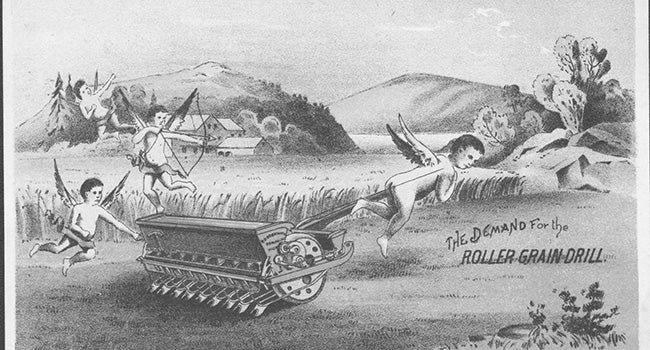P.D. Beckwith’s early years in Dowagiac
Published 10:01 am Monday, May 8, 2017

- An advertisement for P.D. Beckwith’s roller grain drill, which was the business man’s most successful product before he founded the Round Oak Stove Company in Dowagiac. (Photo courtesy of the Dowagiac Area History Museum)
My late friend Grif Cook always said that without P.D. Beckwith, Dowagiac would have been like Pokagon.
No offense to Pokagon — after all, he lived in nearby Sumnerville. His point was that without Beckwith’s impact, Dowagiac never would have grown. That is likely an exaggeration, as Dowagiac was always going to be a primary stop on the Michigan Central Railroad because of several factors. and a downtown business district quickly developed. But the point is well taken.
I have written about many interesting characters in Dowagiac’s history in these columns over the past year, but I have not written much about Beckwith, who was probably the most important individual to live in the city. It will take a couple of columns to write about Beckwith, his life and impact on Dowagiac, so plan on reading more next month.
Philo D. Beckwith was born in Eagle New York in 1825. He moved to Michigan in 1844 with his wife Catherine. Over the next decade, the Beckwith family lived in Detroit, Ypsilanti, Battle Creek, Michigan City, Indiana and Niles.
During those years, he learned how to operate an efficient foundry while he and Catherine began raising a family. They also experienced personal tragedy when their first son, Chester, died at the age of 1 in 1846.
The Beckwiths moved to Dowagiac in 1853. Philo set up a small foundry near the depot, where he made plows, implements, tools and other assorted items.
He must have made a name for himself, as city officials approached him about casting a cannon for the July 4 celebration in 1854. He cast a beautiful cannon that worked well — too well, in fact. The cannon got hot after repeated use and discharged early, resulting in one operator losing a hand.
Despite the injury, the celebration continued and the cannon was used for several decades to herald significant events.
P.D. and Catherine Beckwith had a son, Byron, and a daughter, Katherine, during their early years in Dowagiac. Tragedy struck again when Byron died at the age of 5. Katherine and their first daughter, Mary Della, survived to adulthood.
Kate had her own impact on the city.
Beckwith moved his foundry operation two times until he settled in on the east side of the railroad tracks, north of Judd Lumber Company.
In the 1860s, Beckwith partnered with a local farmer and inventor named John Gage in the production of the roller grain drill. Gage did not stick with the partnership for long, but this became Beckwith’s primary product in the 1860s.
The grain drill was a practical invention that made life easier for farmers. It was a horse-pulled implement that would cut several furrows, drop the seeds in the furrows and then cover the seeds with dirt all in one pass.
Before the invention of grain drills, farmers would have had to plow rows, drop seeds by hand and hope the birds did not eat the seeds before they could be covered. Many people in the agrarian communities in the U.S. were inventing similar implements.
While the roller grain drill was a fine product -— it won Beckwith a silver medal from the State of Michigan’s Agricultural Society, which can be viewed at the Dowagiac Area History Museum — it was an expensive product. There was also competition in the marketplace (remember those other inventors) and an agricultural depression followed the Civil War, which depressed sales further.
As a result, it did not make Beckwith a wealthy businessman — in fact, he had to borrow from local businessmen, relatives and banking houses in Battle Creek to stay afloat throughout the decade.
His business struggles did not prevent Beckwith from being an active citizen in Dowagiac. He personally planted trees to help beautify the village; he was elected a village trustee in 1861, his first political office; he was active in the local lodge of the Free and Accepted Masons; and he helped organize and build the Universalist Church.
Steve Arseneau is the director of the Dowagiac Area History Museum. He resides in Niles with his wife, Christina, and children, Theodore and Eleanor.






